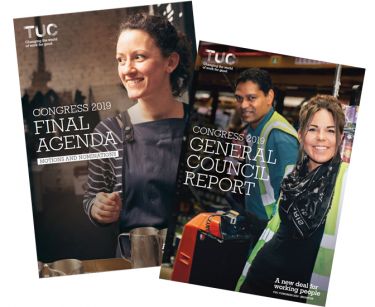General Council Report 2019
4.1 Introduction
The last 12 months have seen no easing of the pressure on our public services as we struggle to cope with rising demand at a time of staff shortages, cuts to funding and closure of services. As resolution 68 illustrated, essential parts of our public sector such as fire and emergency services are being pushed to the brink, posing a threat to the wellbeing of workers and communities alike.
Despite the Chancellor’s rhetoric, we expect further real-terms cuts to many services over the course of the next spending review. In line with composite 8, the TUC continues to campaign for a fair funding settlement across the public sector. Throughout the year we have commissioned analysis from the New Economics Foundation (NEF) that has enabled us to map the impact on departmental budgets and to identify the level of spending our public services need.
In its Austerity by Stealth report, the NEF demonstrated that, under current spending plans, areas outside of the so-called ‘protected’ budgets of health, education, defence and international development were likely to see further cuts of between 2 and 4 per cent per capita by 2023. And, as the Institute for Fiscal Studies reported, the additional funding for the NHS falls far short of what is needed, while schools will continue to see real-terms cuts per pupil. The NEF’s analysis estimated that a further £32bn would be required by 2023 in order to meet demand and improve services across a range of areas including health, social care and schools.
4.2 Education
Over the past year, the TUC has worked closely with affiliated unions on policy and workforce issues relating to education in line with resolutions 32, 53 and 56 and composites 9 and 10. The TUC has continued to facilitate regular meetings of the education unions to coincide with the meetings of the Public Services Liaison Group and support coordination with wider public services campaigning and the TUC Campaign Plan 2018–19.
The meetings of the education unions have focused on developing strategic support for the main campaigning issues highlighted in the Congress resolutions on education, including the education funding crisis, excessive workload in schools, corporal punishment, the mental health and wellbeing of teaching and support staff, the abuse of data in education policy and practice, the failings of our post-16 education system, and continuing opposition to the expansion of academies, free schools and selective education.
The General Council has continued to highlight the education funding crisis, in particular the funding shortfall facing schools and colleges.

In line with composites 9 and 10, the General Council has continued to highlight the education funding crisis, in particular the funding shortfall facing schools and colleges and the detrimental impact of this on educational provision and the pay and conditions of teaching and support staff. Particular concerns have been raised about special needs education, with local authorities facing a major shortfall in SEND funding during a period when there has been a significant increase in the number of young people with education, health and care plans.
The General Council has given its support to the Love Colleges campaign coordinated by FE employers and unions, and the call for: a fully funded entitlement to a first level 3 qualification for all adults; increased funding for colleges; and a fair pay deal for all FE staff.
Paul Nowak, TUC deputy general secretary, was appointed to the Independent Commission on the College of the Future that is being coordinated by the Association of Colleges.
The TUC welcomed some of the recommendations in the final report of the review of post-18 education and funding chaired by Philip Augar, in particular proposals to: boost funding for our college system; introduce fully funded entitlements to a first level 2 and/or level 3 qualification for all adults; and reintroduce HE maintenance grants and widen access to grants for students doing sub-degree qualifications.
However, the General Council remains concerned that the Augar Review has constructed a reform agenda largely based on a remodelled version of the existing HE loan system. As highlighted in the TUC’s original evidence to the review, there is a risk that this will extend the damaging consequences of a loan-based approach to other parts of the education sector, leading to higher levels of unsustainable student debt for more individuals.
Earlier this year the TUC responded to the government’s consultation on the impact of the introduction of T Levels on the long-term public funding of existing vocational qualifications, such as applied general qualifications. In line with many other stakeholders, we strongly argued the case for maintaining public funding for qualifications, such as BTECs, to ensure that the needs of all learners are fully met under the reformed system.
4.3 NHS and social care
In line with composites 11 and 12, the TUC worked with unions and campaigners at a national and local level to campaign for a proper funding settlement for health and social care, parity of esteem for mental health services, support for healthcare workers and an end to the outsourcing and privatisation of health services.
The chancellor confirmed additional funding for the NHS in the 2018 autumn budget that would provide annual real-terms increases of around 3 per cent to the Department of Health budget up to 2022/23. However, as the IFS and Health Foundation reported, this fell short of the 4 per cent a year that’s needed to improve services, plug provider deficits, address the shortfall in capacity and invest in transformative change and new integrated models of care. This funding also does not cover capital investment, public health or training and education budgets that are crucial to underpinning an effective NHS workforce strategy. And, of course, there was still no additional funding for social care.
As a result, we continued to see the NHS struggling to deliver services within an unprecedented decade-long spending squeeze, with waiting lists and waiting times increasing, available beds decreasing and 100,000 unfilled staff vacancies.
We continued to see the NHS struggling to deliver services within an unprecedented decade-long
spending squeeze, with waiting lists and waiting times increasing, available beds decreasing and 100,000 unfilled staff vacancies.
Mental health remains one of the worst affected areas. In October 2018, the TUC published its report Breaking Point: the crisis in mental health funding – with new analysis commissioned from the NHS Support Federation showing dramatic decreases in mental health doctors, nurses and beds in the last five years. This data was included in a revised version of our campaigning app, which allowed people to look up the impact of cuts to mental health services in their local postcode and lobby their MP. This will continue to be used as the TUC, together with unions and campaign groups, steps up the joint campaign for a better funding settlement for the NHS and mental health services specifically, including a conference with Health Campaigns Together in September 2019. In doing so, we will also be highlighting the impact that cuts to school funding and local authority services are having on mental health services, as we see more cuts to school support for at-risk pupils and local drug and alcohol dependency services.
At the beginning of the year, the NHS Long Term Plan was published setting out ambitious plans for reform through funding for priority areas like mental health, greater integration across health and social care, greater use of technology and proposals to increase staffing, providing new routes to entry, training and progression. We have significant concerns about how the lack of funding could undermine the workforce strategy, untested assumptions about the benefits that digital services will bring to all service users and the capacity to deliver ambitious integration proposals with such high levels of unfilled staff vacancies and the ongoing impact of the funding squeeze.
However, there are some positives and the TUC, along with health unions, supported many of the proposals for legislative change that NHS England is advocating that will undo some of the damage caused by the competition regulations in the Health and Social Care Act 2012.
The TUC also worked with health campaigners to help coordinate support for union campaigns against the outsourcing of services through subsidiary companies (subcos) set up by NHS providers. While we welcomed the pause following the introduction of new guidance, we are concerned that in recent months the green light has been given for further subcos to be established and we will continue to campaign against them.

4.4 Privatisation and outsourcing
The tremors from the collapse of Carillion continue to be felt across our public services as more high-profile outsourcing companies face similar difficulties, including Interserve, Kier Group, Four Seasons and Allied Healthcare. Ministers were forced to bring probation services back in-house following their chaotic privatisation and NHS England is currently consulting on reforms to regulations that could remove some of the competition, outsourcing and fragmentation brought in by the coalition government’s reforms in 2012.
The past 12 months have seen a number of high-profile strikes by public service unions in defence of the pay and rights of outsourced workers with the full support of the TUC, including outsourced PCS members fighting for the real living wage at the Department of Business, Energy and Industrial Strategy and a successful campaign against outsourcing at Princess Alexandra Hospital in Harlow led by UNISON members.
In accordance with composite 7, the General Council pressed the case for a change of direction in public service outsourcing. In November 2018, we brought public service unions together with the Cabinet Office to inform its plans to reform HM Treasury guidance on outsourcing. We called for a more rigorous public interest case to be applied to outsourcing decisions, greater support for employment standards through the procurement process in line with the objectives of the government’s Good Work Plan and greater transparency on outsourced services across the public sector.
We followed this up with a roundtable with the Cabinet Office in May 2019, held jointly with the Business Services Association, to look at how the government can strengthen its social value procurement framework, again making the case for a stronger focus on employment standards and support for trade union access and collective bargaining.
The TUC continued to work with unions and other campaign partners, such as We Own It and the Co-Operative Party, to make the case for new models of public ownership, informing the Labour Party’s policy development around insourcing and public ownership.
We are also working with the Association of Public Service Excellence (APSE) to develop easy-to-use online tools that give step-by-step advice and guidance on insourcing services and social value procurement that unions, local authority councillors and others can use to develop alternative approaches.
4.5 Civil service
Workers across the public sector continue to labour under the impact of funding cuts, job losses and attacks on pay and pensions. In the civil service, we have seen public servants increasingly subjected to unwarranted attacks on their impartiality and effectiveness by politicians and commentators with axes to grind in the Brexit debate, as highlighted by resolution 65. In response to this, the TUC wrote to the minister for the Cabinet Office seeking a clear message to civil service unions that the integrity and impartiality of civil servants would be promoted and protected by whoever leads the government going forward.

4.6 Local government
Local government continues to see significant cuts to funding. The National Audit Office reported that central government funding for local authorities has effectively been cut in half since 2010/11 and this year saw the largest single cut in revenue support grant from central government in a decade.
Since 2010, local councils have spent 10 per cent less on adult social care, 20 per cent less on the local environment and an alarming 48 per cent less on housing.
This situation will be exacerbated by the widening of inequalities in local authority funding, as the government withdraws grant funding and requires councils to self-fund through retention of business rates, council tax and local charges alone. This year, the TUC published new analysis commissioned from the New Economics Foundation which showed that, even with the government’s limited redistribution measures, the gap between council revenue in some of the wealthiest and poorest areas of the country is set to dramatically increase. The TUC is calling for a fairer system of equalisation and redistribution of retained business rates in order to address regional inequalities and stimulate economic growth in every region.

4.7 Justice
TUC policy on the criminal justice system is guided by resolutions 66 and 67. In line with these, we collaborated with colleagues in UNISON, GMB and Napo on the Speak up for Justice campaign, which works with a range of civil society groups and public sector partners to roll back the government’s damaging reforms to the justice sector and protect it from further attacks.
We submitted a consultation to the Ministry of Justice’s (MoJ) review of the probation system (Transforming Rehabilitation), laying out how we believe the errors of the government’s privatisation programme should be rectified. In May, the MoJ announced that it will bring 80 per cent of the probation service back into public ownership, following campaigning by unions in the sector and a series of damning reports from the National Audit Office (NAO) and the Chief Inspector of Probation.
Despite increased funding in the last two years, spending on prisons has fallen by 16 per cent from 2009/10 to 2017/18 and staffing levels remain 15 per cent below 2010 levels. Violence in prisons continues to be a major concern. The frequency of reported assaults on staff has almost tripled since 2010, with a 26 per cent increase in the last year alone and prisoner-on-prisoner violence has increased at an even sharper rate. Noting composite 4, we drew attention to the crisis of safety in the prison system, which affects prisoners and prison officers alike. We support calls by unions to end and roll back privatisation. And we support calls for funding to ensure prisons are safer for prison officers and inmates.
4.8 Public sector pay
The General Council’s work on public sector pay is governed by resolution 61, composite emergency resolution 1 and emergency resolution 7. In line with this, the TUC continued to call for fair pay for public sector workers.
In 2015, the General Council set out five tests for a fair pay deal for public sector workers, including funded increases, fair pay awards across all public services, freedom for collective bargaining and genuinely independent pay review bodies, tackling low pay through the real living wage and the restoration of lost earnings since 2010. Although in some sectors – such as the NHS, local government and the National Probation Service – unions were able to use new flexibility to secure some advances on pay, the government has still failed to deliver against the tests we set out.
The TUC will continue to press the case for fair pay for public service workers, calling on the chancellor to
ensure sufficient funding is provided in the spending review to fund fair pay awards.
In some sectors such as the civil service, prisons and the police service, pay awards were below inflation, meaning more real-terms pay cuts. Outside of the NHS, no funding was provided to support pay increases, putting additional strain on departmental budgets. This year, for example, civil service pay has been capped at 1 per cent but with departments able to provide an additional 1 per cent – where this is affordable and doesn’t impact on delivery of services, according to Treasury guidance. The government continues to ignore the recommendations of pay review bodies, with ministers rejecting the recommended 3.5 per cent award for teachers on the upper pay scale or in leadership roles, despite the pay review body highlighting the necessity of this to address the recruitment and retention crisis in our schools.
The TUC will continue to press the case for fair pay for public service workers, calling on the chancellor to ensure sufficient funding is provided in the spending review to fund fair pay awards across all public services. Analysis by the New Economics Foundation, commissioned by the TUC, shows that a pay award above inflation that restores earnings to 2010 levels would cost an additional £8.5bn by 2022/23. The research also showed that almost half of this is recouped to the Treasury through increased tax revenue, reductions to in-work benefits and indirect tax revenue as a result of wider economic growth resulting from the multiplier effect.
The TUC has also challenged the government over proposals to cap exit payments, covering voluntary severance, redundancy and other payments, at £95k for all public sector workers. We highlighted the impact that this will have on a range of medium earners, and how it rides roughshod over existing collective agreements and reduces the scope for unions and employers to work together to secure workforce reforms.
4.9 Public Services Forum
The Public Services Forum brings together the TUC and public service unions, the Cabinet Office and relevant public service employers, including the Local Government Association and NHS employers, to agree joint programmes of action in relation to strategic issues affecting the public service workforce.
In the last 12 months, we have worked jointly on developing a cross-public-sector response to the government’s Good Work Plan, with the aim of launching a new good work toolkit for use by managers and union officers and reps later this year.
We held two roundtables of unions and employers looking at how we can effectively deliver good-quality apprenticeships across the public sector. And we have staged two roundtables looking at revisions to the government policy and practice on outsourcing and social value procurement.

4.10 Transport
The TUC has continued to campaign for improvements to our transport systems to benefit passengers, workers and the whole economy. We believe that publicly owned, democratically accountable rail is the best option. Train operating companies (TOCs) privatise the profits from running lines, but the risks and penalties are paid for by the public. In 2018 the taxpayer was liable for £38m for Govia Thameslink because the nature of its contract meant the Department for Transport (DfT) had to compensate it if profits didn’t meet expectations. The industry still relies on large subsidies from the taxpayer.
We continue to campaign for an end to train franchises, pointing out the failures of the current system. In line with composite 17 and resolution 11, we called for a publicly owned rail network. In January, we published research showing that season tickets still cost up to three times the proportion of earnings for UK passengers than they do for European passengers taking similar journeys. Season tickets in England can cost 13 per cent of average earnings. Tickets for equivalent journeys in Germany, France or Belgium cost between 3 and 4 per cent. Meanwhile, train companies have paid billions of pounds in dividends, as passengers struggle with frequent cancellations and delays, and union members’ jobs are attacked.
Reforms to Network Rail promise to unite track and train. But by bringing private companies back into infrastructure maintenance they threaten to create a series of regional Railtracks, putting safety at risk.
We published research showing that season tickets still cost up to three times the proportion of earnings for UK passengers than they do for European passengers taking similar journeys.
We raised all these issues in a substantial response to Keith Williams’ root-and-branch review of the rail industry. In our submission we pointed out that it is more expensive to use private finance and outsourcing to fund and deliver projects and services on the railways. We also highlighted the value passengers see in having a safety-critical staff member on their trains.
The last year has seen an attack on rail workers pay. As noted in emergency composite 9, attempts to link reductions in ticket prices to cuts in pay are dishonest and have to be resisted. The TUC was clear that the real problem on our railways is not workers’ pay: instead it is a broken franchise system, huge dividends for investors and rocketing fares on packed, unreliable commuter trains.
TUC policy on freight is guided by resolution 13. The UK’s rail freight capacity increased from 1996 until 2013/14, but since then it fell by 25 per cent. Once freight capacity is lost it is very expensive to replace. Rail freight is a more efficient, greener method than transporting goods by road. Keeping freight is essential if we are going to reduce our carbon emissions. We will continue to press for more recognition of the environmental and economic benefits of the rail freight system.
In line with resolution 14 and composite 1, the TUC has undertaken a comprehensive programme of work during this Congress year to oppose social dumping, and to promote better employment rights and safer workplaces, including in the maritime sector. We have campaigned on these issues in the UK and have worked with European and international colleagues to campaign on them throughout the world. This has included developing new proposals for sectoral collective bargaining, which is particularly important among fragmented sectors that are harder to organise.
Stay Updated
Want to hear about our latest news and blogs?
Sign up now to get it straight to your inbox

